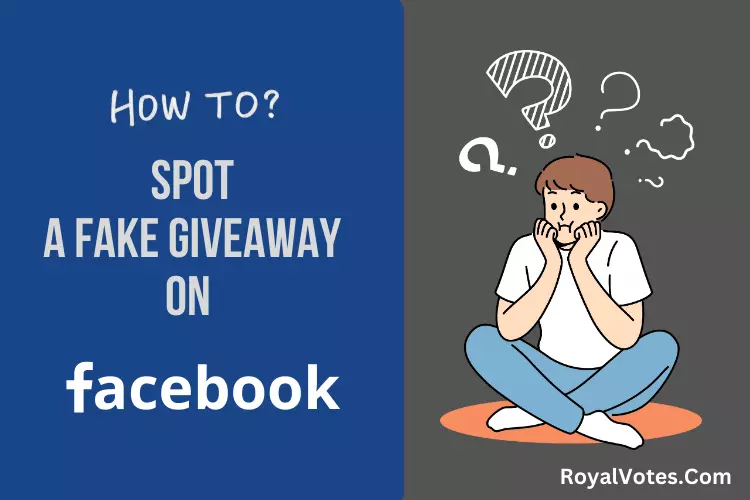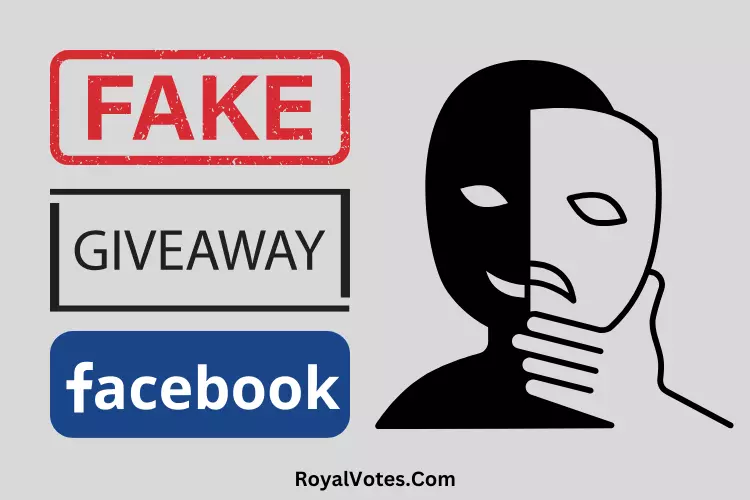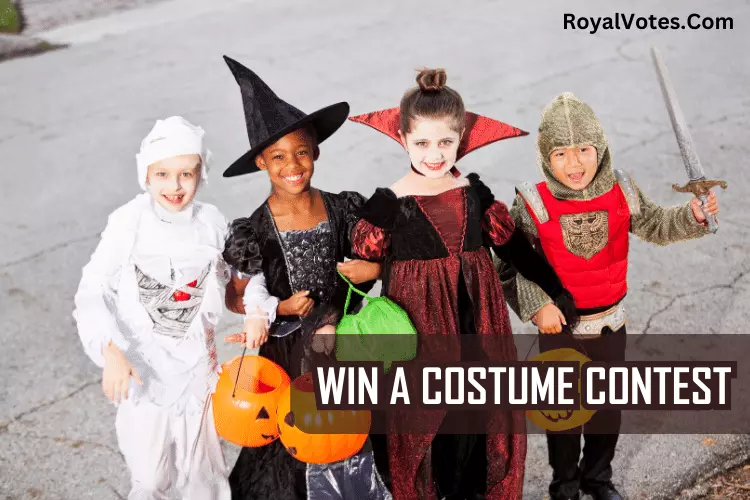How to spot a fake giveaway on Facebook? In festivals like Christmas or New Year’s Eve, while brands conduct giveaways to attract more followers, some scammers take advantage of the situation and conduct fake giveaways on Facebook.
People fall for these scams due to their lack of experience or greediness. Well, worry no more because I have got you covered. I will tell you all the 12 red flags to help you identify a fake giveaway on Facebook.

How to Spot a Fake Giveaway on Facebook: 12 Red Flags
Let’s dive into the details of how to spot a fake giveaway on Facebook, step by step.
#1. Fake Brand Name
Scammers often create a page that impersonates a well-known brand, but upon closer inspection, you may notice slight misspellings or inconsistencies in the brand name. For example, instead of “Apple Inc.”, the scam page might be named “Apple. Inc” or “App1e Inc”. Such small anomalies can be a huge red flag indicating a fraudulent giveaway.
Moreover, fake giveaway pages will often have a very low number of followers and posts, as they are created solely to scam people.
Check out the below video on how to identify fake Facebook profiles.
#2. Unrealistic Prizes
Another clear indicator of a fake giveaway is the offering of unrealistic prizes. Scammers often promise extravagant rewards that seem too good to be true. For instance, a newly created page with a low follower count might claim to be giving away the latest iPhone model to a hundred random users who like, share, or comment on their posts.
Legitimate brands rarely give away high-value items so freely, especially not in such large quantities. So, whenever you see a giveaway offering prizes that seem overly generous or unrealistic, it’s likely to be a scam. Remember the adage – if it seems too good to be true, it probably is.
#3. New Page:
A newly established page running a grand giveaway is another potential sign of a scam. Facebook pages created just days or weeks ago and already promising giveaways of expensive products should raise suspicion.
For example, if you come across a page named “Samsung Mobile USA,” created only a month ago and conducting a giveaway of the latest Samsung Galaxy model, it’s likely fake.
Established brands usually have years of Facebook history and thousands, if not millions, of followers. Always check the ‘About’ section of the page to see when it was created before entering any giveaway.
#4. Fake Engagement
Scammers often resort to tactics to artificially inflate the engagement on their giveaway posts to make them appear more legitimate. This can include fake comments and likes, often from accounts that appear brand new with little to no personal information or activity.
For instance, you might notice that a post from a “Nike Giveaway” page has thousands of likes and hundreds of comments within a few hours of being posted despite the page only having a few hundred followers.
When you look at the comments, you might observe repetitive phrases, such as several users commenting the same thing, like “Wow, I hope I win.” If you click on the profiles of these commenters, you may find that they were created recently, have few friends, have no profile picture, or have no posts of their own. All these are telltale signs of fake engagement.
Moreover, you might observe an unnaturally high number of shares. Scammers manipulate users into sharing the post with promises of increasing their chances of winning. However, a legitimate giveaway does not typically require you to share the post to increase your chances.
Read also: How to get engagement on Facebook?
#5. Poor Visual Quality
Another red flag of a fake giveaway on Facebook is poor visual quality in terms of images or graphics used. Scammers may not invest time or resources to create high-resolution, professionally designed visuals. Instead, they often use poorly edited images, misspelled texts, or logos that seem distorted or pixelated.
For example, consider a giveaway post that features a picture of the latest iPhone. On closer inspection, the image appears to be low-quality, stretched out, or has noticeable editing artifacts. The text overlayed on the image might be misspelled or inconsistently sized.
Moreover, the brand’s logo may appear distorted or be of a low resolution. Legitimate brands rarely, if ever, would use such poor visuals for their giveaways, as they have a brand image to maintain.
#6. Erroneous Caption
Erroneous captions in a giveaway post can serve as a significant indicator of a fake Facebook giveaway. Such captions often contain grammatical errors, spelling mistakes, or incorrect usage of brand-specific terminology.
For example, a post from a page posing as “Microsoft” may refer to their own operating system as “Windows” instead of “Windows.” While seemingly minor, such errors are rarely found in posts by legitimate brands as they maintain a high standard of professionalism in their communication.
Furthermore, scammers may use vague, inconsistent, or imprecise language in the giveaway rules or details. For instance, a fraudulent giveaway post might claim to be giving away a “new iPhone” but does not specify which model or color the prize is.
Or the criteria for winning might be unclear or too broad, such as “Like this post and you could win.” Legitimate giveaways, on the other hand, often have clear, well-defined rules for entry and precisely describe the prize.
Moreover, scammers might use unnecessary capitalization, excessive punctuation, or sensational language to create hype. They may use phrases like “HURRY UP!!!”, “DON’T MISS OUT!!!” or “WIN BIG!!!!”. Established brands rarely use such language, as it appears unprofessional.
#7. Excessive Hashtags
Excessive use of hashtags in a giveaway post can also signify a fake Facebook giveaway. Scammers use many irrelevant or trending hashtags to increase the visibility of their fraudulent posts.
For instance, a post from a page claiming to be “Nike” might be giving away a pair of sneakers, but the post includes hashtags like #iphone, #holiday, #celebrity, or even #covid19. These hashtags have no relevance to the brand or the product being given away and are likely used to attract more views or traffic to the scam.
Legitimate brands usually use a few relevant hashtags, such as their brand name or the specific product or campaign related to the giveaway.
#8. Missing Rules
A legitimate giveaway should always come with a clear set of rules. If a Facebook giveaway lacks participation rules or guidelines, consider it a big red flag. These rules usually specify the eligibility criteria (like age restrictions, location limitations), entry methods, duration of the giveaway, how winners are selected, and when and how the winners will be notified.
For example, you should be skeptical if you stumble upon a post from a page claiming to be “Apple” that’s giving away the latest iPhone but provides no rules or guidelines on how to enter, who can enter, or how the winner will be selected. A legitimate brand like Apple would clearly outline the rules to ensure a fair process and to meet various legal requirements.
Moreover, fake giveaways might not mention when the giveaway ends or how and when the winner will be notified. For instance, a post from “Adidas” might say, “Win a pair of our latest sneakers!” but provides no information about the giveaway’s end date or how the winners will be notified. Without these details, the giveaway post is likely a scam.
#9. Unnecessary Questions
Scammers running fake giveaways often use unnecessary or overly personal questions to gather sensitive data from participants. For instance, a post from a page imitating “Amazon” might ask you to fill out a form requiring your full name, address, email, phone number, bank details, or Social Security Number.
Similarly, the page might pose questions that are irrelevant to the giveaway. For example, a giveaway for a “Tesla Model 3” might ask questions like “Who is your favorite actor?” or “What is your mother’s maiden name?”.
These questions are irrelevant to the giveaway and might be used for evil purposes like identity theft.
#10. Ask for Payment or Purchase
One of the most glaring signs of a fake Facebook giveaway is when the host page asks for a payment or purchase as an entry requirement. Legitimate giveaways rarely require participants to purchase or pay an entry fee.
For instance, you might find a post from a page pretending to be “Rolex” saying, “Win a free Rolex watch! Just pay a $50 shipping fee!”. This is a common tactic employed by scammers to make quick money under the guise of a giveaway.
Similarly, a scam giveaway might ask you to buy one of their products to be eligible for the giveaway. For example, a page purporting to be “Gucci” might post, “Get a chance to win a Gucci bag worth $2000 by purchasing our new perfume! Hurry, offer valid until stocks last!”. Be wary of such posts. Real brands rarely, if ever, require a purchase to enter a giveaway.
#11. Prohibited Entry Rules:
All legitimate brands must adhere to some rules for giveaways set by Facebook’s policies. For instance, according to Facebook’s promotion guidelines, brands cannot ask participants to share the post on their timelines or tag friends as a requirement for entering the giveaway.
Scammers often disregard these policies and use such tactics to increase engagement and reach for their fake giveaway posts.
Another prohibited entry rule is requiring participants to like or follow the page as an entry requirement. Legitimate giveaways might encourage participants to like or follow their pages, but it should never be a mandatory entry rule.
If you come across a giveaway post that requires any of these prohibited actions, it’s likely a scam and should be reported immediately.
#12. No Reply from Host:
If you’ve interacted with the host page of a giveaway and received no reply or a vague, automated response, this could be a sign of a scam. Legitimate brands typically have a dedicated team to respond to comments or messages from participants or potential customers, especially during a promotion or giveaway event.
For example, if you’ve questioned the legitimacy of a “Samsung” giveaway and received no response or a generic message like “Thanks for your interest!” there’s a chance it could be a fake giveaway.
Authentic brands prioritize open, clear, and respectful communication with their audience. Any lack of engagement or dismissive responses should be viewed with suspicion.
Read also: How to spot any fake giveaway?

How Fake Giveaways Work on Facebook?
Fake giveaways on Facebook rely on people’s desperation to win something valuable for free. Scammers use enticing offers like luxury products, cash prizes, or popular gadgets to lure in participants and then exploit them through various schemes.
Let’s know how it works.
Scamming Through Data Harvesting
One common way that a fake Facebook giveaway operates is through data harvesting. For instance, the scammer might create a post that claims to be from a popular brand, such as “Netflix,” announcing a giveaway of a year’s free subscription.
To enter, participants are directed to a separate site to fill out a form with their personal information. This may include details like their name, address, email, and phone number. The scammer can then sell this information to third parties or use it for identity theft or phishing attempts.
Financial Scams Through Fake Giveaways
Another method employed by scammers involves financial fraud. For example, a post masquerading as “Rolex” might announce a giveaway for a luxury watch. However, to be eligible, participants are asked to pay a small amount for shipping.
This is a contrived tactic to collect payments from numerous people, accruing a substantial amount in the process. Those who pay the fee never receive the promised item and effectively lose their money to the scam.
Verifying Authenticity Through Engagement
Scammers often use fake giveaways to verify the active status of Facebook accounts. For instance, a post claiming to be from “Apple” might announce a giveaway of the latest iPhone.
Participants are asked to like, comment, and share the post to enter. This helps the scammer identify active accounts, which they can later target with spam or sell to third parties.
Spreading Malware Through Fake Giveaways
Finally, some fake giveaways are designed to spread malware. A post might claim to be from a brand like “Amazon” and direct participants to click on a link to enter the giveaway.
This link leads to a malicious website automatically downloading malware to the user’s device. The scammer can then use this malware to steal sensitive data or gain unauthorized access to the user’s system.
Drive Traffic to a Landing Page
Fake giveaways can also be used to drive traffic to a landing page. Scammers might create a post for a giveaway claiming to be from a reputable brand like “Nike.”
The post directs participants to click on the link in the caption or bio, which leads them to a landing page with fake products or services. The scammer can make money through advertisement revenue or trick users into purchasing.
Be cautious of such tactics and always verify the authenticity of a giveaway before clicking on any links or providing personal information.
Read also: Facebook contest ideas
How to Avoid Giveaway Scams on Facebook?
Since you know about all the red flags and common tactics used in fake giveaways, here are some tips to help you avoid falling prey to such scams on Facebook:
Check the Brand’s Official Page
Before participating in any Facebook giveaway, visit the brand’s official page. Facebook typically verifies authentic pages and has a blue checkmark next to their name.
Additionally, official pages will have substantial followers, regular high-quality posts, and professional photos. Any giveaway should also be mentioned on the brand’s official page. If you can’t find any information about the giveaway there, it’s probably a scam.
Use Reliable Sources for Information
Avoid getting your information solely from pop-up ads or direct messages. Scammers often use these methods to lure victims into their traps. Instead, ensure you’re using reliable sources for information. If a brand conducts a legitimate giveaway, it will likely announce it on its official website or social media channels.
Be Cautious of Unrealistic Offers
Scammers often use extravagant prizes to attract more victims. If the offer seems too good to be true, it probably is. Legitimate giveaways will offer realistic prizes. Before entering, it’s a good idea to do some research. Compare the offer with other giveaways from the brand to see if it’s in line with what they usually offer.
Don’t Share Personal Information
Never share your personal information such as address, credit card details, or social security number, especially if not through a secure, official website. Scammers can use this information to steal your identity or commit fraud. Legitimate giveaways will never ask for such sensitive information.
Beware of Sudden Friend Request or Messages
If you receive a friend request or message from an unknown person claiming to be affiliated with the brand conducting the giveaway, it’s likely a scam. Legitimate brands will not reach out to participants through personal profiles. Be cautious of sudden messages or requests, and avoid engaging with them.
Report Suspicious Activity
If you come across a suspicious giveaway, don’t hesitate to report it to Facebook. Your report can help protect others from falling victim to the same scam. You can also report the scam to your local law enforcement agencies.
Following these precautions allows you to participate in Facebook giveaways without jeopardizing your privacy and security.
Read also: Giveaway ads on Facebook
Conclusion
Now, you know about the various types of scams that operate through fake giveaways on Facebook. These include data harvesting, financial fraud, verification tactics, malware spreading, and driving traffic to landing pages.
To avoid falling prey to such scams, check the brand’s official page for any giveaway mention and not share personal information or click on suspicious links.
Don’t forget to share this content with your friends and family to help raise awareness and protect them from giveaway scams on Facebook. Together, we can make the online world a safer place.


